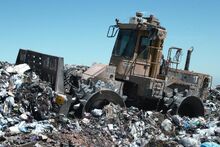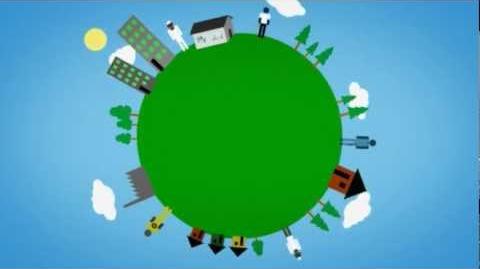No edit summary |
(Moving Erichlawson's page from Wastemanagement to here, overwriting existing stub.) Tags: Visual edit apiedit |
||
| Line 1: | Line 1: | ||
| + | === Modern Waste Management === |
||
| − | {{stub}} |
||
| + | Waste management is a critical industry in every community, part of the process of maintaining a good quality of life for all citizens. While it has been behind the scenes since cities and towns were first developed, it has grown into a modern technological business with state-of-the-art facilities and processes. |
||
| + | [[File:Waste_management.jpg|link=http://green.wikia.com/wiki/File:Waste_management.jpg|thumb|220x220px]] |
||
| + | '''Addressing Society’s Needs''' |
||
| + | There are political overtones in everything done to address society’s waste management needs. Innovations must be approved and comply with environmental concerns. For progress to be made, changes in approach must be adaptable and publicly acceptable. Fortunately, in large part, this is the case. For example, anaerobic digestion has been found to be the answer to biowaste (such as organic food or sewage) in the face of the obsolescence of landfills. If you can convert biowaste to compost and fertilizer, you are not only avoiding leachate and gas, but you are offering a useable product that will not affect climate change with harmful emissions. As a solution, anaerobic digestion by means of microorganisms also has vast implications for biogas energy usage. |
||
| − | '''[[Waste]] management''' is the collection, transport, processing, [[recycling]] or disposal of [[waste materials]]. The term usually relates to materials produced by human activity, and is generally undertaken to [[reduce]] their effect on health, the [[environment]] or aesthetics. Waste management is also carried out to recover resources from it. Waste management can involve solid, liquid, gaseous or radioactive substances, with different methods and fields of expertise for each. |
||
| + | |||
| + | Philosophical positions are strong when it comes to waste. A Zero Waste policy is on the lips of many politicians and community leaders. If people can change their lifestyles and adopt a more proactive stance and sense of responsibility, the vast problems of disposal can be met. [http://www.norcalcompactors.net/trash-compactors/ Waste management]has become an ethical issue of vast proportions. Words like reuse, recycle, and energy conversion are part of the modern vocabulary. |
||
| + | |||
| + | Users are one end of the spectrum, producers another. They also have a duty to control toxicity and keep equipment repaired and in good working order. Dumping old electronic machinery is anathema to everyone. Policies like Extended Prouder Responsibility have been instituted to try to ameliorate the practice and stem its spread, particularly I Asia and Africa. In addition, agencies have been established to address greenhouse gases such as the [http://www.iswa.org/ ISWA (International Solid Waste Association)]targeting waste sector activities for emission reduction. Such organizations expect to impact the carbon footprint of the industry in the coming years. Thus waste management is less the villain and more the harbinger of change. |
||
| + | |||
| + | ==== Resources & Articles on Waste Management ==== |
||
| + | * [http://www.epa.gov/waste/ Waste Quick Finder By EAP.Org] |
||
| + | * [[wikipedia:Waste_management|Wiki on Waste Management]] |
||
| + | * [https://www.rethinkrecycling.com/residents/reduce/top-10-ways-reduce-waste RethinkRecycling] |
||
| + | * [http://www.reduce.org/ Reduce.Org] |
||
| + | * [http://www.recyclenow.com/reduce/reduce-your-waste-5-easy-steps RecycleNow.Com] |
||
| + | Meanwhile, technological advancement keeps marching forward. [http://www.epa.gov/waste/nonhaz/municipal/wte/ Waste to energy (WTE)], alternately known as energy from waste (EFW) is a recognized form of treatment that disposes of, but does not convert, waste. New processes like gasification, pyrolysis, thermal depolymerization and plasma arc gasification are impressing environmentalists as replacements for noisy and dangerous incinerators that have always been the subject of community objection. Furthermore, turning waste into vehicle fuel has been lauded as an excellent solution (biofuel). Emissions from landfill can be turned into electricity while WTE plants turn energy into steam. |
||
| + | [[File:Don't_Waste_Your_Waste|link=http://green.wikia.com/wiki/File:Don't_Waste_Your_Waste|thumb|330x330px]] |
||
| + | Don't Waste your waste - [https://www.youtube.com/channel/UCO5Q69IF1AKEOQ1_oVYAuuw Video presentation by Valentino Ristevski] |
||
| + | |||
| + | With progress at hand, it is still a governmental issue to establish parameters for the industry and secure practical applications. Countries around the world struggle variously to separate and control waste disposal. The industry faces enormous challenges but seems to be universally dedicated to finding solutions like infra-red sorters that protect the environment, are safe and cost effective, and work well long-term. |
||
| − | Waste management practices differ for developed and developing nations, for urban and rural areas, and for residential and industrial, producers. Management for non-hazardous residential and institutional waste in metropolitan areas is usually the responsibility of local government authorities, while management for non-hazardous commercial and industrial waste is usually the responsibility of the generator. |
||
{{Waste management}} |
{{Waste management}} |
||
[[Category:Air Pollution]] |
[[Category:Air Pollution]] |
||
Revision as of 09:26, 5 February 2015
Modern Waste Management
Waste management is a critical industry in every community, part of the process of maintaining a good quality of life for all citizens. While it has been behind the scenes since cities and towns were first developed, it has grown into a modern technological business with state-of-the-art facilities and processes.

Addressing Society’s Needs
There are political overtones in everything done to address society’s waste management needs. Innovations must be approved and comply with environmental concerns. For progress to be made, changes in approach must be adaptable and publicly acceptable. Fortunately, in large part, this is the case. For example, anaerobic digestion has been found to be the answer to biowaste (such as organic food or sewage) in the face of the obsolescence of landfills. If you can convert biowaste to compost and fertilizer, you are not only avoiding leachate and gas, but you are offering a useable product that will not affect climate change with harmful emissions. As a solution, anaerobic digestion by means of microorganisms also has vast implications for biogas energy usage.
Philosophical positions are strong when it comes to waste. A Zero Waste policy is on the lips of many politicians and community leaders. If people can change their lifestyles and adopt a more proactive stance and sense of responsibility, the vast problems of disposal can be met. Waste managementhas become an ethical issue of vast proportions. Words like reuse, recycle, and energy conversion are part of the modern vocabulary.
Users are one end of the spectrum, producers another. They also have a duty to control toxicity and keep equipment repaired and in good working order. Dumping old electronic machinery is anathema to everyone. Policies like Extended Prouder Responsibility have been instituted to try to ameliorate the practice and stem its spread, particularly I Asia and Africa. In addition, agencies have been established to address greenhouse gases such as the ISWA (International Solid Waste Association)targeting waste sector activities for emission reduction. Such organizations expect to impact the carbon footprint of the industry in the coming years. Thus waste management is less the villain and more the harbinger of change.
Resources & Articles on Waste Management
Meanwhile, technological advancement keeps marching forward. Waste to energy (WTE), alternately known as energy from waste (EFW) is a recognized form of treatment that disposes of, but does not convert, waste. New processes like gasification, pyrolysis, thermal depolymerization and plasma arc gasification are impressing environmentalists as replacements for noisy and dangerous incinerators that have always been the subject of community objection. Furthermore, turning waste into vehicle fuel has been lauded as an excellent solution (biofuel). Emissions from landfill can be turned into electricity while WTE plants turn energy into steam.

Don't Waste Your Waste
Don't Waste your waste - Video presentation by Valentino Ristevski
With progress at hand, it is still a governmental issue to establish parameters for the industry and secure practical applications. Countries around the world struggle variously to separate and control waste disposal. The industry faces enormous challenges but seems to be universally dedicated to finding solutions like infra-red sorters that protect the environment, are safe and cost effective, and work well long-term.
